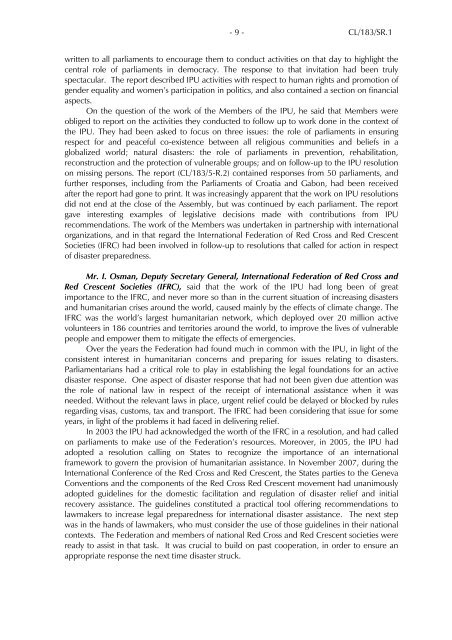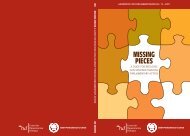CASE No - Inter-Parliamentary Union
CASE No - Inter-Parliamentary Union
CASE No - Inter-Parliamentary Union
Create successful ePaper yourself
Turn your PDF publications into a flip-book with our unique Google optimized e-Paper software.
- 9 - CL/183/SR.1<br />
written to all parliaments to encourage them to conduct activities on that day to highlight the<br />
central role of parliaments in democracy. The response to that invitation had been truly<br />
spectacular. The report described IPU activities with respect to human rights and promotion of<br />
gender equality and women’s participation in politics, and also contained a section on financial<br />
aspects.<br />
On the question of the work of the Members of the IPU, he said that Members were<br />
obliged to report on the activities they conducted to follow up to work done in the context of<br />
the IPU. They had been asked to focus on three issues: the role of parliaments in ensuring<br />
respect for and peaceful co-existence between all religious communities and beliefs in a<br />
globalized world; natural disasters: the role of parliaments in prevention, rehabilitation,<br />
reconstruction and the protection of vulnerable groups; and on follow-up to the IPU resolution<br />
on missing persons. The report (CL/183/5-R.2) contained responses from 50 parliaments, and<br />
further responses, including from the Parliaments of Croatia and Gabon, had been received<br />
after the report had gone to print. It was increasingly apparent that the work on IPU resolutions<br />
did not end at the close of the Assembly, but was continued by each parliament. The report<br />
gave interesting examples of legislative decisions made with contributions from IPU<br />
recommendations. The work of the Members was undertaken in partnership with international<br />
organizations, and in that regard the <strong>Inter</strong>national Federation of Red Cross and Red Crescent<br />
Societies (IFRC) had been involved in follow-up to resolutions that called for action in respect<br />
of disaster preparedness.<br />
Mr. I. Osman, Deputy Secretary General, <strong>Inter</strong>national Federation of Red Cross and<br />
Red Crescent Societies (IFRC), said that the work of the IPU had long been of great<br />
importance to the IFRC, and never more so than in the current situation of increasing disasters<br />
and humanitarian crises around the world, caused mainly by the effects of climate change. The<br />
IFRC was the world’s largest humanitarian network, which deployed over 20 million active<br />
volunteers in 186 countries and territories around the world, to improve the lives of vulnerable<br />
people and empower them to mitigate the effects of emergencies.<br />
Over the years the Federation had found much in common with the IPU, in light of the<br />
consistent interest in humanitarian concerns and preparing for issues relating to disasters.<br />
Parliamentarians had a critical role to play in establishing the legal foundations for an active<br />
disaster response. One aspect of disaster response that had not been given due attention was<br />
the role of national law in respect of the receipt of international assistance when it was<br />
needed. Without the relevant laws in place, urgent relief could be delayed or blocked by rules<br />
regarding visas, customs, tax and transport. The IFRC had been considering that issue for some<br />
years, in light of the problems it had faced in delivering relief.<br />
In 2003 the IPU had acknowledged the worth of the IFRC in a resolution, and had called<br />
on parliaments to make use of the Federation’s resources. Moreover, in 2005, the IPU had<br />
adopted a resolution calling on States to recognize the importance of an international<br />
framework to govern the provision of humanitarian assistance. In <strong>No</strong>vember 2007, during the<br />
<strong>Inter</strong>national Conference of the Red Cross and Red Crescent, the States parties to the Geneva<br />
Conventions and the components of the Red Cross Red Crescent movement had unanimously<br />
adopted guidelines for the domestic facilitation and regulation of disaster relief and initial<br />
recovery assistance. The guidelines constituted a practical tool offering recommendations to<br />
lawmakers to increase legal preparedness for international disaster assistance. The next step<br />
was in the hands of lawmakers, who must consider the use of those guidelines in their national<br />
contexts. The Federation and members of national Red Cross and Red Crescent societies were<br />
ready to assist in that task. It was crucial to build on past cooperation, in order to ensure an<br />
appropriate response the next time disaster struck.
















